How much of the UK film economy comes from abroad?
As we've previously discussed, the UK film economy is currently in bullish form. One of the major reasons is the high levels of 'Inward Investment' i.e. films from other countries which are choosing to shoot in the UK.
A few people have asked me to give an idea of just how much of the UK film economy comes from abroad.
How much of the UK film economy comes from aboard?
Productions funded by non-British sources have been growing significantly over the past decade. In 2016 they accounted for 85% of the money spent on film production in the UK, up from 67% in 2006. This is thanks to the recent trend of the UK housing some of the world's biggest films, such as all the new Star Wars productions, many Marvel films and most of Tom Cruise's recent movies.
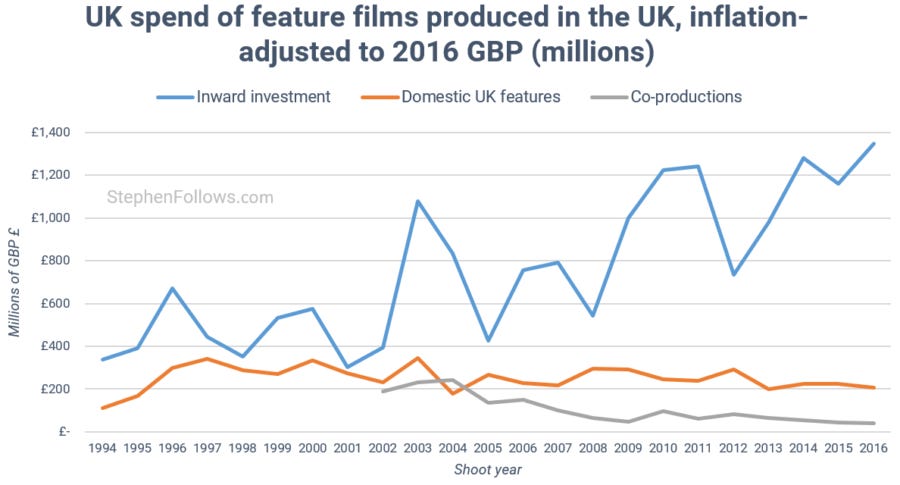
Interestingly, the number of inward investment features shot in the UK actually dropped between 2015 and 2016 (from 62 to 48) but the total amount spent increased.
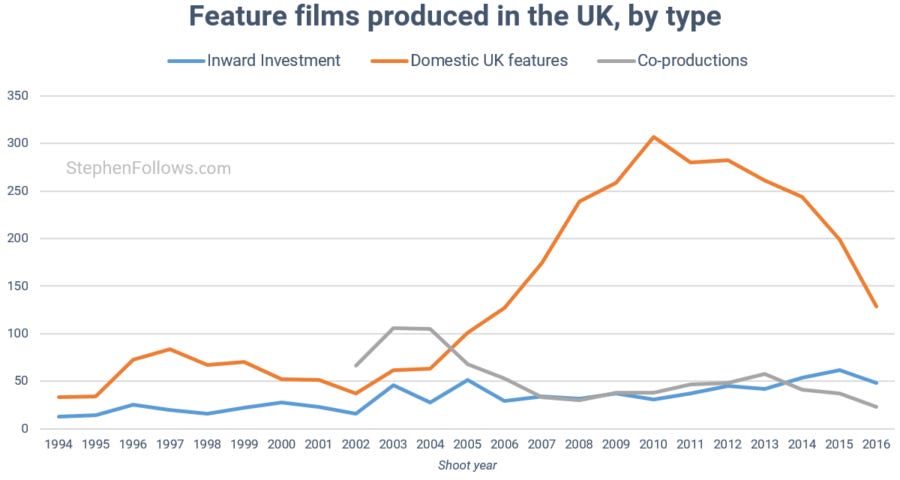
Attracting money costs money
The UK is very active in its efforts to attract foreign production to shoot in the UK. The effort is headed by the British Film Commission, which describes themselves as "the national agency with a remit to maximise and support the production of international feature film and television in the UK".
If you've ever been to a major international film industry event, such as a film market, then you may have spotted their work under the banner 'We Are UK Film'. They run the UK 'home' at such events, eg the UK Film Pavilion in Cannes and in doing so they bring together a whole host of UK public bodies including the BFI, the British Council, the British Film Commission, Creative England, Creative Scotland, Creative Skillset, the Department For International Trade, Ffilm Cymru Wales, Film London, Film Export UK, Great Britain Campaign, Northern Ireland Screen and Wales Screen.
The BFI don't release information on how much is spent specifically on attracting inward investment, but they do release data on the amount spent on 'Export and inward investment promotion' combined. This includes work by the British Film Commission, British Council, locations services in the nations and regions and Creative Europe MEDIA sub-programme support for non-British sales agents and distributors handling UK film exports in the EU.
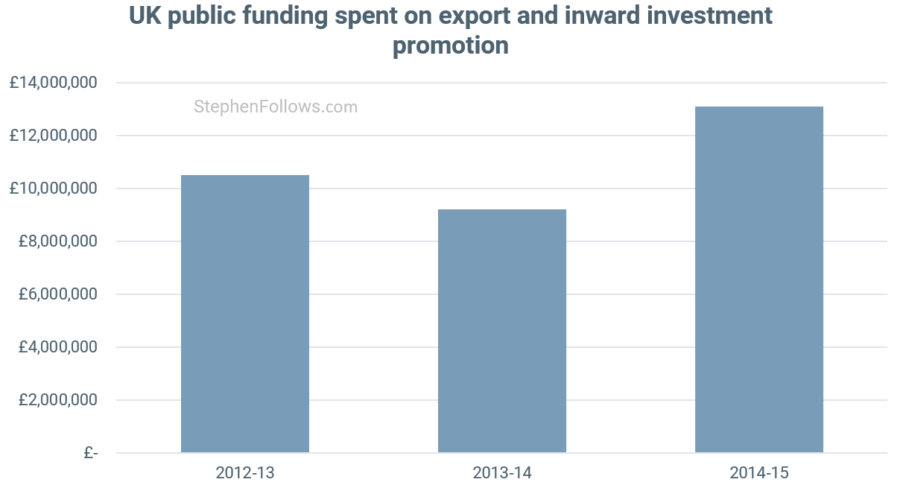
A friendly rivalry with our Canadian buddies
If the UK is attracting more inward investment, then it follows that there must be other countries who are losing out, i.e. they would have otherwise received these productions. From what I can see, I think it's the Canadians who are biggest losers (in this sense only, of course!)
I looked at all films which grossed at least $1 in the US box office over the past two decades, and built a dataset for their filming locations (well, the 88% of movies which I could find location data for). As you can see below, in recent years, the UK is pulling in front of Canada to becomes the second most popular country for movie locations.
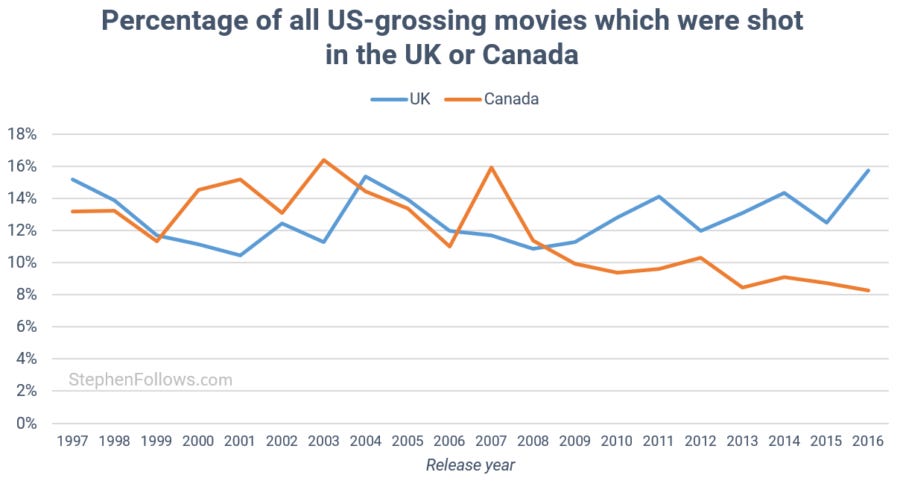
What is causing the shift?
At this point, you may be wondering what's causing the current boom in US productions in the UK and the recent shift away from Canada. The answer is both very simple and very complicated. The simple version is that the studios and producers behind big movies are willing to shoot anywhere in the world and consequently travel to wherever is currently the most cost effective. Shaving a few percent off a Hollywood tentpole budget will save millions of dollars.
The complication comes in when we try to work out what makes shooting in one country more cost effective than in another. Factors include:

Tax rebates. This is the strongest and bluntest method a government has to attract peripatetic productions. This typically involves giving the production money back, based on how much they spend locally. Currently in the UK we have a generous scheme which gives producers a cash rebate of around 20% of the money they spend on making the film in the UK. More about that here: How much has the UK government paid in film tax breaks?
Infrastructure. If a possible shooting location doesn't have modern studio space then the producers will need to calculate the cost of converting existing buildings to accommodate their shoot. In addition, the biggest productions often require spaces larger than traditional movie studios can provide and so often find themselves taking over abandoned warehouses and aircraft hangers, such as the old Boeing hangar in the Mojave Desert which was used to build the terminal in The Terminal and housed an epic water battle for one of the Pirates of the Caribbean movies.
People. There's no point having the studio space if you can't find the crew you need to shoot. In previous research projects I have looked at the number of people who work on Hollywood and British movies and the largest films hire north of 3,000 people. Each person must have particular skills and experience, which takes time and training to establish. If a country is very cheap to shoot in but you need to fly in half your crew then it may not be cost effective.
Exchange rates. When you're looking to spend $200 million somewhere in the world, the ever-fluctuating exchange rates suddenly become a major factor. Some make the claim that the boom in UK inward investment in the past decade is largely down to the weakening Pound against the Dollar. I don't have enough data to be able to test this just yet, but on the face of it, the theory looks credible. For example, compare the changing exchange rate between the Canadian Dollar and the British Pound below, with data from the previous chart showing the UK eclipsing Canada as Hollywood's favourite foreign location.
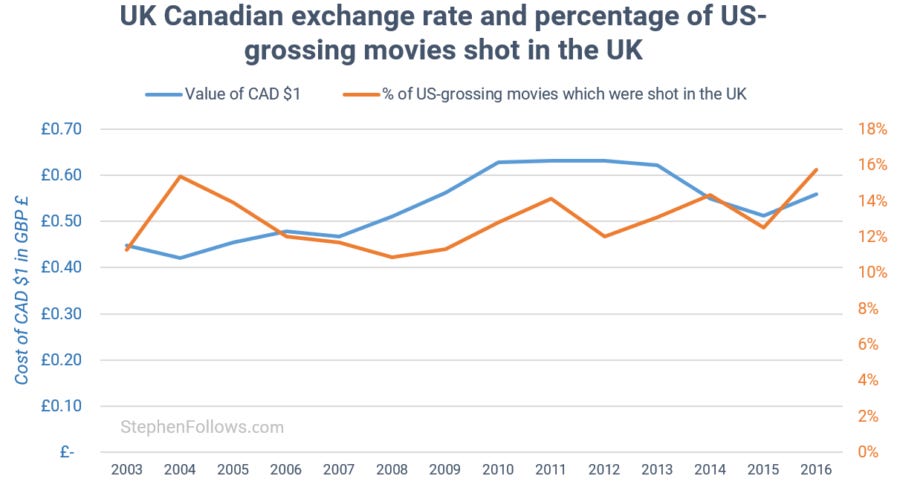
Notes
The data on UK production and spend is thanks to the BFI. It can take time to collect all the data on these topics, so the BFI often slightly revise previous estimates. This means that the data for the most recent years are subject to slight change in the next year's data releases (I have looked at how much these tend to change in a previous research project). I used IMDb and Wikipedia to find filming locations and online calculations for inflation and exchange rates.
Today I was focusing on the UK spend of feature films shot in the UK. This means that there are some aspects of the wider UK film economy which are not included, such as distribution, cinemas, etc.
Epilogue
If you're interested in learning more about where Hollywood shoots, then you might enjoy this old piece of mine, entitled Where in the world are Hollywood productions shot?' It had a narrower focus of movies than my research above, but talks more about why Canada is so attractive to the Studios and looks at other popular countries.
Of course, another reason could be that the Canadians are starting to reject the loud and tasteless frippery of Hollywood movies, in pursuit of a quieter, higher culture. Although this theory may sound wild at first, I introduce into evidence Exhibit A: The new Liam Neeson vengeance-fueled, punch-fest entitled 'Hard Powder' has been refused permission to shoot in Canada's Banff and Jasper national parks.
Parks Canada communication officer Meaghan Bradley went on the record as saying:
Parks Canada is committed to ensuring that activities at all national parks, national historic sites, and national marine conservation areas are respectful of Indigenous traditions, cultures, and contributions to Canada’s heritage.
I don't envy the person who has to tell Mr Neeson, and I also suggest Meaghan Bradley lies low for a bit.


